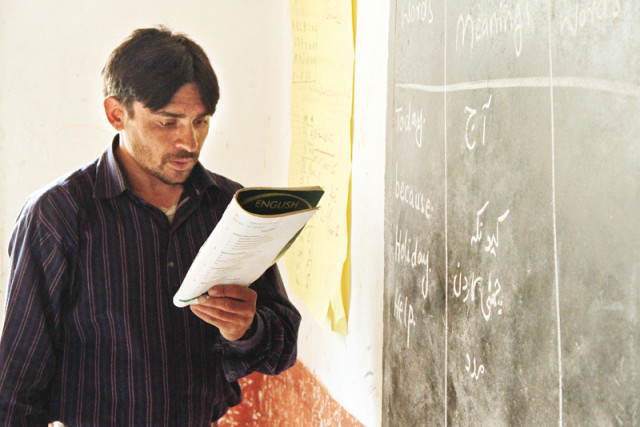Bulbul Khan: Last man standing
The government school at a Gilgit-Baltistan village would have been long shut, had it not been for Bulbul Khan.

He belongs to another village in Gilgit-Baltistan and shares a small room behind the only classroom with a teacher from another school as his humble abode. Every weekend, he walks for hours on foot to visit his family, and on weekdays, he spends most of his time teaching, preparing lessons and checking workbooks, only allowing himself a little time to fish in the evenings to overcome his isolation.

Government Primary School Mahtramdan. PHOTO: DANIAL SHAH
The village of Mahtramdan is so small that it consists of only 12 houses, occupied by eight Wakhi and four Tajik families. There is no interaction with the outside world except for the radio, and basic life necessities are barely met. But that has not deterred Bulbul from faithfully carrying out his teaching duties in the village.

A student going through his lesson. PHOTO: DANIAL SHAH
I came across Bulbul when our party of hikers — who had undertaken the 13-day Wakhan Corridor trek and were en route the Karambar Lake, one of the highest biologically active lakes on earth — reached our first camping site in Mahtramdan. From Gilgit onwards, it was an arduous, yet visually breathtaking journey that took around five hours to Imit valley, home to Bulbul’s native village, and then four hours via jeep to the Mahtramdan. The Wakhan Corridor is a 220km-long and 16 to 64km-wide strip of land that links Pakistan, China and Tajikistan, and was created as a buffer zone between the British Empire and Imperial Russia during the 19th century Great Game.

A student taking out her workbook from her bag. PHOTO: DANIAL SHAH
It was dark when we arrived at the village. Our jeeps had stopped where the road ended, and the only way to make it to the faintly lit, four-walled school was to wade through a water stream. Bulbul was kind enough to spare the school’s only hall for trekkers to sleep overnight. Next morning, we woke up early as students began filing into the hall.
Our trek was long and arduous, but beautiful. We crossed rivers, forests, glaciers and tall mountains. Unfortunately, our expedition hit a snag, and after six days we had to call it off due to unexpected snowfall and harsh weather conditions at the lake. It was when we returned to the school that I witnessed Bulbul teaching five classes consecutively in one big hall.
It was the morning of our journey back home, and as I sipped on a cup of tea, waiting for our jeeps to arrive, the students began filing into their classroom. Some were dressed in casual attire, while others wore torn and crumpled uniforms. Their schoolbags were homemade, bearing locally embroidered designs. The books were old, damaged and stitched.

A homemade school bag . PHOTO: DANIAL SHAH
But Bulbul had a unique way of teaching that almost compensated for the minimal resources. With black chalkboards installed all across the classroom, he formed groups of students for each class. The junior-most students sat in the front while students from the third grade sat at the back. On both sides were students from grade four and five. There were no students for grade two. Bulbul taught alif, bay, pe to the junior students, gave them an activity to do and moved to other groups. While doing so, he kept an eye on every student. After completing his round, with all the classes, he sat on his chair and checked workbooks, individually calling each student while correcting their mistakes.

Junior class in session. PHOTO: DANIAL SHAH
It was heartening to see a government schoolteacher so dedicated to his craft in a country where the education sector is mired by corruption, inefficiency and absenteeism. There are more than 160,000 government-run schools across Pakistan, out of which around 7,000 are ghost schools that exist merely on paper. The Government Primary School, Mahtramdan could have suffered the same fate, if Bulbul had not taken upon himself to run the entire school. “It is sad that these kids will not be able to continue further education after class five,” he says, when asked about the future of his students. “The middle and higher schools are far away, while college and universities are only in the cities.”

The hall at the government school which was used by the trekkers for an overnight stay. PHOTO: DANIAL SHAH
What Bulbul probably fails to see is the chain of change he has already triggered by schooling this handful of students who now at least have a glimpse of a better life. And who knows, some of them might even overcome the hurdles and make it to the other side for a better view.
Danial Shah is a travel writer and a photographer. He tweets @DanialShah_
Published in The Express Tribune, Sunday Magazine, July 27th, 2014.
Correction: In an earlier version of this article, Wakhan Corridor was erroneously mentioned as WaBulbul Corridor. The error has been fixed.



















COMMENTS
Comments are moderated and generally will be posted if they are on-topic and not abusive.
For more information, please see our Comments FAQ